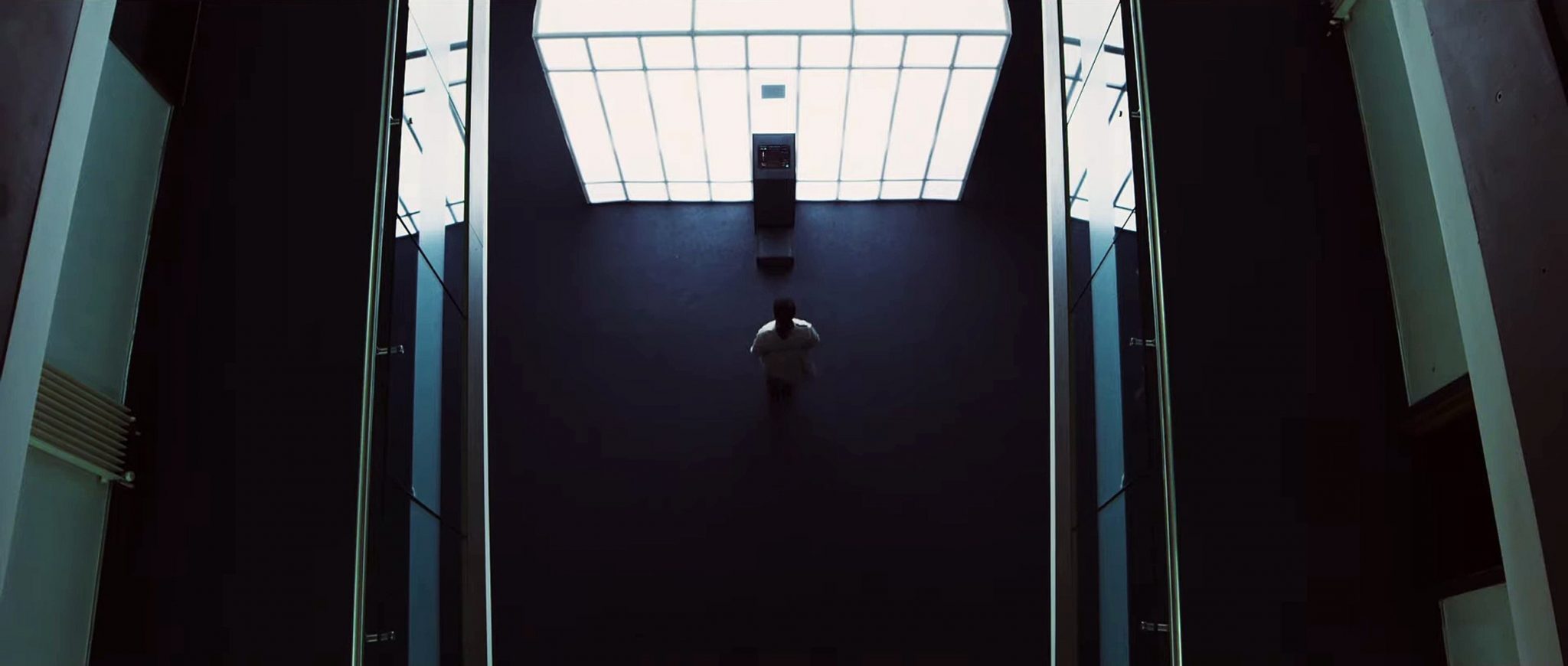One of my favorite low budget films is a little film entitled Infinity Chamber. The premise was simple, and it mainly consisted of a futuristic conversation between a jailed convict and an AI jail keeper. By the end of that particular movie we find ourselves wondering what is real and what isn’t. And today, we have a somewhat similarly titled, and similarly premised idea, though with a very different resultant outcome. This movie was brought to us by Lisa over on the 10×10 movie comment page (another similarly themed movie) and I took pity on the poor girl and finally got off my derrière and watched it. So, kudos to you Lisa!
White Chamber is a movie about a future British war that is causing both sides to do whatever they can to get the other side to capitulate. And, as we walk through the twists and turns of this movie, right side up becomes upside down, and then backwards again. It’s an interesting movie with really fascinating points to be made about War and its justness. And it also talks about man’s larger inhumanity to man in this context. But, I digress… why don’t we throw a trailer in right here – and then talk about it in detail. OK? Great.
If you haven’t seen it yet – do yourself a favor and don’t read any further. The only reason I talk about these movies is so that we can debate them, discuss them, and conjecture as to their meanings. You can find a place to watch here, here, or here.
Quick White Chamber Walkthrough
The movie opens with Chrysler, imprisoned in a white chamber. (I know, clever, right?) Zakarian, the head of the UKLA – the opposition group to the UK government – has Chrysler trapped, and is determined to find out everything she knows and is planning to use the White Chamber to his own benefit. He even lets Chrysler know that even though she apparently has great resolve, this chamber is designed to break that resolve. And the ironic bit, is that Chrysler is doing her best to convince Zakarian that she isn’t even Chrysler. That she is actually an insignificant admin. But, the chamber is determined to make her talk…and after extreme heat, extreme cold, and all kinds of electricity, he is doing all he can to find out who she is and more importantly, what she knows.
First Big Switch
Intriguingly, after the first 20 minutes of the movie or so, it jumps backwards in time five days. And those five days made all the difference. Because at this point, Dr. Chrysler, is the one running the White Chamber, and Zakarian is the one in the torture chamber. The UK government was been working with Chrysler to develop tools in order to break the opposition, and to pull together whatever information that they can from Zakarian. And they have also developed a drug to create a super soldier for their cause. One that feels no pain, and increases strength and alertness. And over the course of the next five days, Chrysler does truly terrible things to Zakarian.
But it’s Ruth, our guide through Chrysler’s world that we should be watching for. Because it’s Ruth who ultimately changes the fate of Zakarian and the fate of all these characters. Because when Ruth tells Chrysler that the outside world needs to know about these atrocities, that she won’t be party to them anymore, Chrysler comes unglued and stabs Ruth. And in a fit of pique, Ruth opens the White Chamber and releases Zakarian from his confinement.
Familial Connections
One of the important threads throughout this movie are the familial connections between the various characters. We learn that Senior Dr. Chrysler and Elenor Chrysler are father and daughter, and the Elenor has taken over the lab and the facility from her father. The second connection, is that Elenor’s brother, David, joined the UKLA and died serving directly under Zakarian. And that leads us to the final connection, which is between Chrysler who hates Zakarian for this. And finally, we learn that Zakarian is actually the family name for the leader of the UKLA. And that there are two Zakarians. There is Daran and Narek. Which, I can’t tell apart. If you know which is which, I’d appreciate a heads up! hahah. But regardless, Zakarian1 basically OD’s on the drug and is mortally injured after being released. But that’s OK, because Zakarian2 is here, his identical twin brother, ready to take up the cause on his behalf.
Which leads us back to the intro we saw at the beginning. Zakarian at the controls, and Elanor in the tank. Eventually he brings her out, and the movie ends with him offering her a job with the UKLA to create a super-drug for his troops.
The End.
Wait, what?
Movie White Chamber Thoughts
White Chamber is a bait and switch discussion about war, interrogation, and torture, for bigger moral purposes. The question posed in White Chamber is simple – is war ever justified? Better yet, more specifically, the question on the table is about whether or not torture is OK, even for a higher moral purpose. We watch as the movie starts with Dr. Chrysler starting in the tank. And then we watch as we go backwards in time in order to fully understand what has really been happening. This swift shift unsteadies us, and causes us to rethink our loyalties and our ties. This had the effect of de-legitimizing both perspectives simultaneously.
Think about it… we start by considering whether it is it OK to torture Dr. Chrysler? This Zecharian guy, he seems evil. And this all seems wrong. Stop torturing Chrysler! But wait, minutes later we realize this all started completely differently, with Zecharian in the tank, and this immediately looks wrong as well! Huh. Why? Maybe because it’s wrong no matter the person in power. Maybe because it’s wrong no matter the cause. But 9/11 man! But Hitler and World War II!! Yeah, this is really controversial thought in some circles. But those circles? They are all wrong.
Have you studied Just War theory at all? The six logical reasons necessary to justify a war, according to Biggar (the great Titan of Just War Theory), are as follows:
One – The war must be undertaken with the intention of establishing a just peace.
Two – It must be defensive.
Three – It must be aimed at protecting the innocent against unjust aggression.
Four – It must have a reasonable chance of success.
Five – It must be declared and waged by a competent governing authority.
Six – And it must be undertaken as a last resort.
If the war meets these six criteria, it can be considered morally justified. And what about torture. If, as defined by Beggar, we are fighting a “Moral War”, then does it also logically make sense that we can torture captured enemy combatants? Shouldn’t it? That is what this movie is all about after all.
When the movie ends with Chrysler effectively switching sides, making a deal for her own life, we realize that Chrysler is not waging a moral war at all. She wasn’t struggling to build the White Chamber, and craft the perfect drug, in order to help the UK reestablish peace in the realm. She was doing it in order to get revenge for her brother. And in so doing, the film makers are saying that there is no such thing as neutral torturers. Objective torture chambers. Non-biased cattle prods. There is no sane war, and worse, there is no logical torture possible. It literally cannot be done.
Personal Thoughts on the White Chamber
I grew up in the world of extreme right wing politics. Reagan was my jam. If Michael P. Keaton were real, I would have been him. When I worked for a short time on Capital Hill, I reveled being close to my boss, Senator Grassley, and reveled in the power he wielded at the head of the Judiciary Committee. But over time, I have walked away from the extreme ideological struggles that both Democrats and Republicans have waged. I’ve walked away from the “Just Wars” that they have fought.
And why? Because the honesty of America’s “Just Wars” have faded and fallen away for me. The emphasis on Justice, and “assistance” to our neighbors seems more and more like a ruse to me. Similarly, this movie is saying, yes, racial stereotyping is evil. And racism, evil. But putting aside morality to blow your enemies brains out really seems to falter when investigated closely. The war I’d like to see America fight? Is for the widow, the orphan, the impoverished. Whether that’s locally or abroad I don’t care a bit about. Pick a place, and fight a war on their behalf. But today, it seems like we are too interested in fighting for a our personal interests than about anything really important.
But maybe that’s just me.



